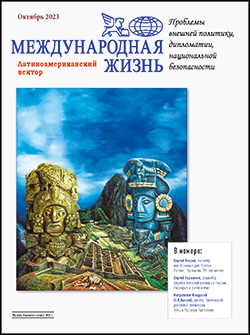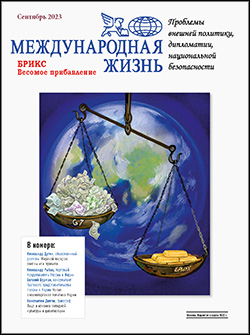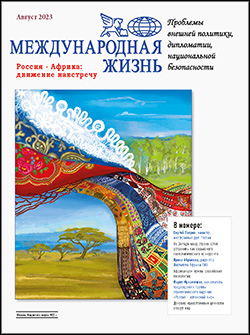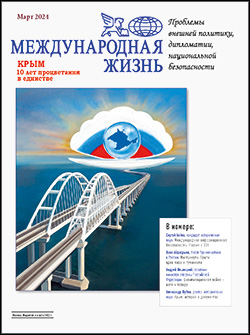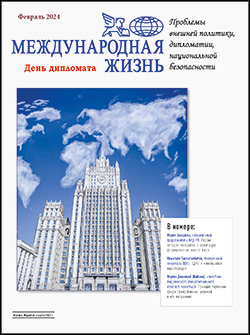Trends
BRICS in the system of global governance
M. Larionova
The role of the BRICS countries in the system of global governance is not a function of one variable, that is to say, the economic growth of BRICS countries. A significant contribution to the growing influence of BRICS is a progressive strengthening of cooperation between the countries. Since the crisis of 2008, BRICS coordination has widened and deepened in various policy areas, in different formats and on different levels. Experience to date has accumulated a database which allows for a quantitative and qualitative analysis of cooperation in several ways.
Energy diplomacy and the modernization of Russia's Federal Energy Commission
Zhiznin C.
Russia is making a significant contribution to global energy security, and is one of the main suppliers of energy resources to the markets of Europe and Asia. At the same time, Russia does not play a significant role in the technology segment of European and Asian energy security. FEC countries and related industries need to replace obsolete and worn-out equipment, which requires huge investments, and advanced energy technologies.
Chief Editor`s Column
Who will protect the Christians of the East?
Oganesyan A.G
Over the past seven years, the number of cases of physical violence and terrorist acts against Christians in Africa, Asia and the Middle East has increased by 309%. The "Arab Spring" has exacerbated the process, making it an avalanche. By the end of last year 200 thousand Copts had fled their homes in search of shelter from the repression of the new authorities. In Iraq, the number of Christians has decreased from one million to less than 500,000. In Southern Sudan, a historical habitat for Christians, from 53 to 75 thousand people have left.
Geopolitics
Russian-Brazilian relations after the Cold War
Fabiano Melnychuk
In rethinking their identities Russia and Brazil observed similarities: both countries withdrew from the commitment to an international order based on a liberal consensus, and the recognition of a unipolar world (under the leadership of the U.S.) after the Cold War. Russia began to study a multipolar world, and Brazil`s was based on the concept of common development. It is noteworthy that, while Brazil and Russia have taken a liberal identity, their collaboration was negligible.
China - Africa: the experience of mutually beneficial cooperation
Alexander Boguslawski
Now, of course, the fact that China has become an integral part of life in Africa is no news. Since the mid-1990s, Beijing conducted a deliberate policy of increasing bilateral relations with African countries, especially with those rich hydrocarbons and minerals such as Sudan, Angola, Nigeria and Zambia.
The U.S. in Afghanistan
Sergeev V.
According to the plan of U.S. President Barack Obama by late 2014 in Afghanistan, instead of the current 102 thousand troops there will remain 20-30 thousand, who will serve as security and support. More than 40 thousand troops from Britain, Canada, Australia and other allies of the White House are likely to be withdrawn completely.
The economic development of Uzbekistan in the post-crisis period
Ikramzhan Ergashev
Actually the current economic situation in Uzbekistan, with low standards of living for the vast number of families is not acceptable for Uzbekistan by way of "shock therapy" in the transition to a market economy. In practice, it turns upon the public "shock without therapy" that is, the rapid dissolution of all existing structures, norms and relationships, that is, with total destruction.
Humanities vector
The origins of the unity and diversity of world cultures and civilizations
K. Dolgov
Whereas previously the world's religions and cultures have been bastions of spiritual and cultural development, the basis of moral and social world order, then gradually they began to experience a crisis: internal fragmentation and inconsistency. Besides religion and the church, often have a permanent negative impact in crisis, corruption, and the decadence of society and the state.
Problems of interaction between civilizations and non-state players in international relations today
Sadykov E.
In a complex system of international relations it is important to highlight objective factors, the effect of which is becoming a universal catalyst for the progress of the whole human community. Contemporary global processes require special critical thinking on global changes in society, challenges of sustainability, of social, economic and political development, and the search for mutually acceptable solutions.
Germany: from cultural imperialism to a strategy of equal partnership
Ogneva A.
The majority of German historians agree that the beginning of a consistent policy in the cultural area was laid out exactly from the moment of the introduction of systematic funding for German schools abroad. It was during this period in the German Empire that the term "foreign cultural policy" appears.
90 years of "International Affairs"
"International Affairs" celebrated their anniversary in business
Bookshelf
Pages in postwar history: the Soviet Union and Germany are taking the first steps towards each other
Orlov. A.A
In the book by V.D.Ezhov what captivates is that the memories are sustained in a classic memoir style, combined with a profound meditation by the author on nature's complex and contradictory processes that characterized the revival of Germany in the late 40's and 50's of the last century. We can see that the events of more than half a century ago still touch the author, and make him again and again analyze them, including in hindsight.
Afghanistan and Iran through the eyes of a diplomat
Akopov P.
The literature on Afghanistan and Iran, countries close to Russia, is replenished with a new work. A member of the Presidency of the Council of the Association of Russian diplomats, Ambassador E.D.Ostrovenko, has published the book "30 years with Afghanistan and Iran."
New systems generate new problems
Elena Ponomareva
The book by Bazhanov E.P, Bazhanova N.E "International relations in the twenty-first century", is devoted not only to the analysis of the tectonic changes that have occurred in the last two decades and continue to occur in the international system, but is a deep philosophical essay on the nature of man and society, the role of subjective and objective factors in global transformations as a world system in general, and our everyday lives.
Читайте другие материалы журнала «Международная жизнь» на нашем канале Яндекс.Дзен.
Подписывайтесь на наш Telegram – канал: https://t.me/interaffairs

 12:05 08.04.2012 •
12:05 08.04.2012 • 